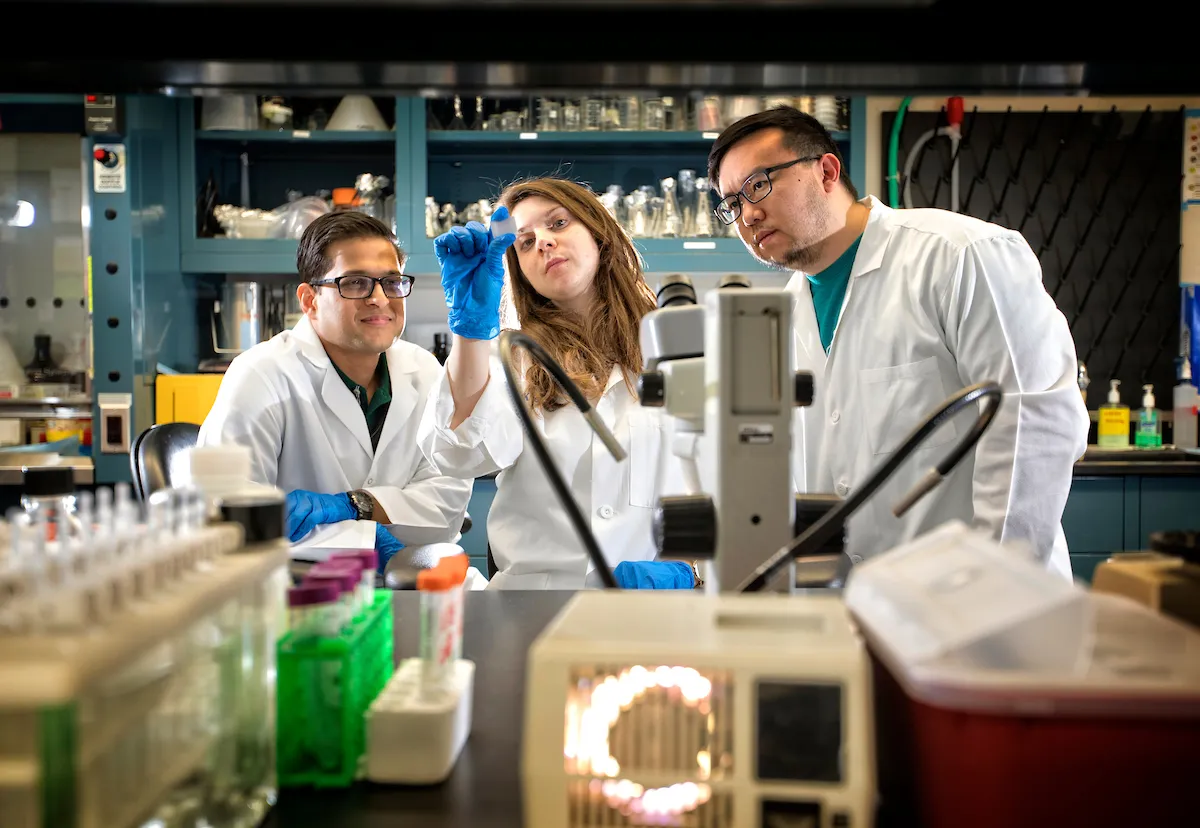
Curriculum
Program Timeline
The MD/PhD curriculum at the University of Kentucky follows a traditional MSTP-style curriculum. Our average length of training is 7.3 years. Below is the typical timeline for training; in rare instances, individuals may tailor a different program.

• USMLE STEP 1 Examination (M2)
• Qualifying Examination (G1-2)
• F30 Fellowship Application (Year 4)
• Thesis Defense (G4)
• USMLE STEP 2 Examination (M3)
Medical Training
During their medical education years (M1-M4), UK MD/PhD students adhere to the expectations and curriculum of the UK College of Medicine. Students also complete two mandatory research rotations in the summers prior their first and second years of medical school. For more information, please see Transitions.
Core Principles Phase (M1, M2)
Pre-clinical curriculum at UK is distinct in its simultaneous development of classroom knowledge and clinical skills. Coursework on foundational medical sciences is coupled with ethics and immediate patient interactions. The early and frequent application of classroom skills increases retention and builds confidence, creating a strong base for clinical practice. Additional information on the core principles phase can be found here. This phase culminates in passing the USMLE STEP 1 Examination in the spring of the second year of medical school (M2), after which Track A MD/PhD students transition to graduate school. If a student has not yet selected a dissertation laboratory, they may perform a third research rotation followed by M3 (Track B).
It is important to note that MD/PhD students are expected to identify their dissertation mentor during M2 (M3 for Track B students) to allow for the timely completion of a formal application to the PhD program within that mentor's department. It is recommended that this application be completed in early January for a summertime transition to staring one's PhD. Refer to Transitions for more specific details on applying to The Graduate School.

Application Phase (M3)
Most students return to medical school in the summer or fall of MS3. The third-year curriculum provides the student with broad exposure to the major medical disciplines and associated sub-specialties through a total of nine clerkship rotations. Students become active participants in providing patient care and practice their clinical skills by assessing patients, discussing plans with patients and colleagues, and directly participating in the delivery of medical care. The completion of M3 is marked by passing the USMLE STEP2 Examination. Track A MD/PhD students return to M3 following completion of their PhD, while Track B MD/PhD students begin graduate school following M3.
Advanced Development Phase (M4)
The fourth year of the UK College of Medicine curriculum is designed to allow students to tailor their education depending on their residency selection. Emphasis is placed on specialized coursework relevant to the student's future career, and mastering clinical skills to prepare for their intern year. All students must complete a total of eight 4-week courses, including:
- Electives (5): Chosen to maximize skill development relevant to the student's interests and intended career. Electives include both clinical and research settings, and can be completed at the University of Kentucky or another approved site ("away rotations").
- Acting Internships (2): Place students in the role of an intern (first-year physician) to directly prepare them for the responsibilities and skills inherent to this role. MD/PhD students complete AI's in one medical and one surgical discipline to demonstrate breadth of skill.
- Transition to Residency: A capstone course that combines workshops, simulation, and standardized patients to ensure that graduating medical students possess the critical knowledge and skills required for the supervised practice of medicine.
Graduate Training
Students are required to complete two research rotations, one in each summer prior to their first and second years of medical school. These rotations are crucial for identifying a dissertation mentor, building a professional network, and choosing a suitable department. For more information, please see Transitions.
During the graduate years (G1-4), students complete requirements as determined by their particular graduate department, including coursework, qualifying exams, and dissertation defense. Students who select a graduate department in the College of Medicine can receive credit for successful completion of the first two years of medical school to satisfy the requirements of first year of the Integrated Biomedical Sciences Program curriculum. For more information, please see the Graduate School tab.
During their final year of graduate school, MD/PhD students return to and audit the M2 'Introduction to Clinical Medicine' course to reacclimate to clinical environments. Each student is paired with experienced faculty or talented junior faculty that facilitate clinical skill development through supervised patient interviewing, care coordination discussions and physical examinations. Additionally, upper level MD/PhD students lead clinical pathology conference discussions three times a year. For more information, please see Transitions.